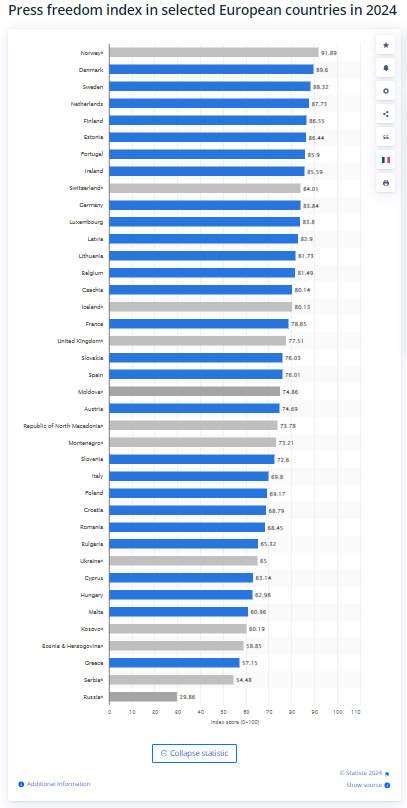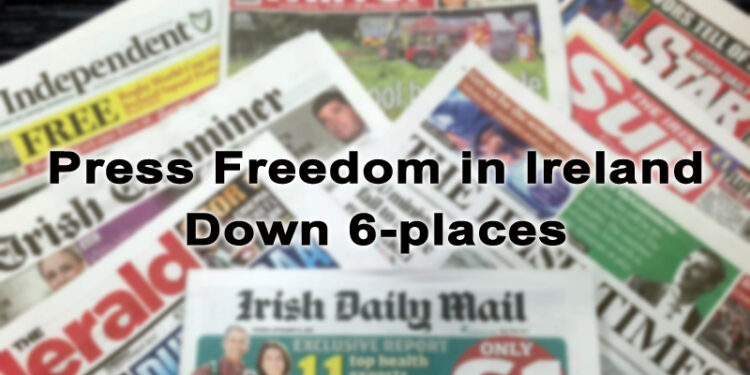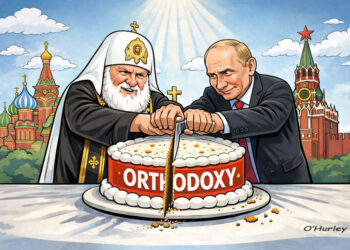by Miceál O’Hurley
DUBLIN — The 21st edition of the World Press Freedom Index (2023), a report compiled annually by Reporters Without Borders (RSF), shows Ireland ranked as having a generally “positive” press freedom climate. The report expresses some significant concerns, however. Ireland dropped 2-places in a single year in the latest World Press Freedom Index ratings.
Concerns over the rising trend of right-wing activity, attacks on press freedom and structural barriers were considered in the report. The report notes the uncertainty regarding funding for Ireland’s national public service media outlet RTÉ and Ireland’s ‘most popular’ political party, Sinn Féin, aggressively using defamation and other laws to curtain reporting and access to information along with disinformation being problematic.

Sinn Féin Accused of “Coordinated Campaign Against Media”
The prospects of a Sinn Féin government, which would represent a first since 1922, presents a chilling possibility for the ability of journalists and media outlets to report fairly and thoroughly given Sinn Féin’s repression of press freedoms in both the Republic of Ireland and in Northern Ireland where the party holds the position of First Minister. Sinn Fein has been accused of engaging in SLAPPs (Strategic lawsuit against public participation) as a tactic to repress free reporting. In January 2024 a Court in Northern Ireland dismissed a libel action taken by Sinn Féin’s Gerry Kelly against journalist Malachi O’Doherty. In his decision, the Judge concluded that “on the balance of probabilities” the proceedings bore the “hallmarks of a SLAPP” and were initiated “for the purpose of stifling the voices of his troublesome critics”.
In the Republic of Ireland, party leader Mary Lou McDonald and her husband have themselves used legal action against the media in what is widely held to be attempts to deter legitimate investigations and coverage.
In the aftermath of the 7 October 2023 Hamas attacks on Israel, Irish Times correspondent Harry McGee wrote concerning the disparity between Sinn Féin’s official condemnation of the attacks upon civilians and their social media posts, “what was notable from the reaction of the left in Ireland was an avoidance of any direct condemnation of the Hamas attack…Instead, the response was largely either to ignore the atrocity, or to contextualise the attack as a product of Israeli oppression.” Notwithstanding citing specific media posts both the Irish Times and McGee found themselves facing a legal action initiated by Sinn Féin, TD Chris Andrews.
According to a letter to Sinn Féin which was co-signed by Reporters Without Borders (RSF) and other media and journalists organisations the party was engaging in what it called, “a coordinated campaign against the media in Ireland”. Legal proceedings were, the letter highlighted, initiated without resort to the Press Council of Ireland. The letter stated, “Everyone has the right to defend their good name, but the law should not be used as the first line of defense. This is especially true for politicians, who must respect the essential role that journalists have in holding power to account.” Suing a journalist personally was cited as having a particularly chilling effect on press coverage.
"As more than half the world's population goes to the polls in 2024, RSF is warning of a worrying trend revealed by the 2024 World Press Freedom Index: a decline in the political indicator, one of five indicators detailed in the Index. States and other political forces are playing a decreasing role in protecting press freedom. This disempowerment sometimes goes hand in hand with more hostile actions that undermine the role of journalists, or even instrumentalise the media through campaigns of harassment or disinformation. Journalism worthy of that name is, on the contrar" Anne Bocandé RSF editorial director
Also of concern in the report is how the An Garda Síochána Act of 2005 has created a barrier to journalists pursuing legitimate stories of public interest. According to Reporters Without Borders (RSF), the Act “had made “interviewing police sources…virtually impossible”. The Act prohibits law enforcement from speaking to journalists without prior authorisation, under penalty of dismissal, a fine or up to seven years in prison.
Given the rise of right-wing and fascists activities there has been growing concern over the safety of journalists. Hate-filled rhetoric and threats issued on social media have been increasing in recent years. However, the report states, “On occasion, Irish journalists have reported that their safety has been threatened by criminal groups, but no significant cases have been reported in recent years”.
Worldwide Trend Worrying
Worldwide, press freedom is under attack by the very authorities that should protect it. Russia, which has earned a reputation for harassing, jailing and even assassinating journalists is ranked last in all of Europe on the issue of press freedom. Outside of Eastern Europe, which with some exceptions overall enjoys low rankings for press freedom, Malta stands out for its abysmal rating. In 2017, journalist and anti-corruption activist Daphne Anne Caruana Galizia was blown-up with a car bomb after exposing Government officials activities that were exposed by the Panama Papers. Malta has been roundly criticised for its response to the murder and their continued repression of a free and independent media. Her family sites Maltese authorities for condoning Malta’s “culture of impunity” which they claim has shielded Joseph Muscat, Keith Schembri, Chris Cardona, Konrad Mizzi, Attorney General Peter Grech and a litany of police commissioners who have steadfastly refused to take appropriate action to protect journalists and root out corruption.
The Reporters Without Borders (RSF) global analysis is sobering. The report cites the decline of government protection of journalistic freedoms. Additionally, disinformation, often initiated and sustained with Government or political party sources, poses a significant threat to an informed electorate. The report cites the “best and the worst”:
“The overall decline in the political indicator has also affected the trio at the top of the World Press Freedom Index. Norway, still in first place, has seen a fall in its political score, and Ireland (8th), where politicians have subjected media outlets to judicial intimidation, has ceded its leading position in the European Union to Denmark (2nd), followed by Sweden (3rd)”. [Emphasis added]
Worldwide, 120 journalists and media workers, including 11 women, were killed in 2023.
















































